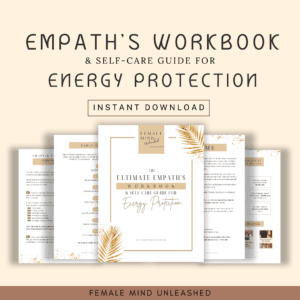Manage Your Anger: 6 Ways To Cultivate A Peaceful Mind
Learning To Manage Your Anger
If you’re looking for ways to manage your anger, you’re not alone. While nearly every woman feels angry at different times (it’s a primitive, basic, and sometimes helpful emotion), we don’t often share our experiences with it. This is mostly because our society still hasn’t found a place for it. Because few women feel comfortable openly expressing when they are angry (thank you, patriarchy), it can be hard and scary to navigate this most mighty feeling alone.
Anger is best understood as the coupling of two other emotions: most often, fear hand-selects a trusty sidekick like shame or sadness and forms a codependent covalent bond that you do not want to mess with.
Anger loves control. When you feel angry, it is safe to say there are factors at play that you have no control over. Anger is the brain’s attempt to regain that power and control. While the expression of anger differs widely from person to person, the root of the feeling is fairly universal:
Fear + Other Difficult Emotion + Loss of Perceived Control = Anger

Anger, when unregulated, can wreak havoc on your inner worlds and tests your relationships. Anger expressions can range from loud and overtly destructive to quiet and passive-aggressive and everything in between. (Despite popular belief, quiet anger can be just as damaging as loud anger.)
The superficial power anger gives us can feel temporarily intoxicating. The reality is that our unregulated words and actions can isolate us more than anything.
Anger furies, stonewalls, destroys connection, and feeds resentment.
It’s likely you’re here because you’re ready to learn how to manage your anger and avoid these negative repercussions. Change is possible!
Read below for 6 tips that will inspire ownership of this powerful emotion so that you can control the one thing you can – you own behavior.
1. Practice Deep Breathing
Everyone from meditation gurus and yogis to leaders and public speakers relies on this one precious method to access inner stillness. For good reason, too. A deep breath in and a long exhale out really can make you feel lighter in just a moment.
The benefits of deep breathing when you’re feeling heated can be tremendous. For one, every mindful, focused breath you take gives you a ten-second break from your racing thoughts. You’re flooding more oxygen to your brain, creating a mini natural high. Sometimes, the simple reminder that you’re alive in this wild world can alter your perspective just enough to let something go.
2. Take a Time Out
Time outs are a great tool when you find yourself tempted to take the gloves off and engage in some dirty fighting with a spouse, relative, or friend. To initiate a healthy time out, announce to the other party that you need some time to cool down. Let them know how much time you need, whether it’s ten minutes or an hour, and that you intend to return afterward. It is possible to communicate productively even in heavy moments, and stating your needs is a must.
Set a ground rule that both parties spend time reflecting during this time apart – no disappearing into the wasteland of the internet or other mindless distractions. A proper time out can do wonders to repair a connection and create a safe space for further discussion.

3. Improve Your Self-Talk
It doesn’t matter what you’re getting angry about or what’s triggering you – you can learn to temper and manage your anger. You can feel anger about traffic, a meeting that ran late, a spouse’s behavior, the wifi cutting out, an unexpected bill, the neighbors’ band practice… you name it. The common thread that ties our experiences together is that most things that anger us are things we can’t control.
What we can control is our self-talk in these frustrating moments. As we become more aware of our anger and its expression in our lives, we’ll start to see a trend of negative self-talk that not only co-signs but encourages our angry behavior. Self-talk is situational so we may develop variations of common themes depending on the circumstances.
Examples of negative self-talk include:
“Of course this happened, nothing ever seems to go right.”
“If she was really my friend, she wouldn’t do this.”
“He doesn’t respect me, and he never will.”
“I’ll never get ahead, everyone else has it figured out.”
It’s easy to see how much power a negative thought can have during a vulnerable (read: fearful) moment. If you work to swap out your negative self-talk for more positive alternatives, you’ll be equipped to constructively approach problems in you life – rather than offer emotional knee-jerk reactions to them.
4. Challenge Your Beliefs
If you think of self-talk as the script for the expression of anger, you can imagine that your beliefs are the hard-coded templates. Our beliefs, in regards to power and control, inform our perspective of the roles we play with those around us.
As we develop into adults, we inherit and form a set of beliefs that serve to safeguard our egos. A form of unwritten moral law, they dictate how we allow others to treat us, and justify our responses to any mistreatment or injustices. Unlike self-talk, a belief is unwavering and informs almost all of our anger expressions.
Examples of power/control beliefs:
“I have to make this person hear my point, no matter the cost.”
“There is only one right way to do this – and I know the way.”
“They can’t treat me like this and get away with it.”
“I have the right to hurt him since he hurt me.”
“I have the right to punish her.”
“I’m right. He’s wrong.”
Each of these beliefs stems from the need to regain footing and control in an emotionally vulnerable or scary situation. We subconsciously give ourselves permission to enforce these beliefs, no matter the cost, to protect ourselves from humility, sadness, pain, disappointment, and more. A shift in beliefs won’t happen overnight; becoming aware of what your beliefs are is a great first step. Then, as you become more comfortable analyzing your thoughts and behaviors, you can start to challenge your template and better manage your anger reactions.

5. Embrace Vulnerability
Anger gives us a false sense of security and power when we’re feeling threatened or insecure. What our inner selves really need in these moments is a safe space to express our fears. Vulnerability is where real healing occurs. Introducing vulnerability to the moment requires exposing some of your deepest thoughts. The conscious effort to choose vulnerability and connection over anger and skulking or screaming can be a difficult one to make!
Start small by engaging in self-talk or journaling when you’re feeling upset about something. Instead of a rant, the conversation should be as objective as you can tolerate. For those of us with high pride, it feels a little unnerving engaging with ourselves this way. But, the more often we set free some of our perceived truths the less powerful our anger becomes. Checking in with yourself is great practice for becoming more vulnerable and loving with those around you.
6. Let Yourself Make Mistakes
Rome wasn’t built in a day! If you’re setting out to build your own empire, you can’t expect overnight success either. So many of us carry around lifelong habits without even understanding why they were formed or what purpose they serve. Taking the first few steps into a thorough self-inventory is a huge feat to be immensely proud of.
We all make mistakes. Learning to manage your anger – whether quiet, loud, insidious or demanding – requires a great deal of self-love and patience along the way. A balanced system of acknowledgment, critique, and patience is helpful. Patting yourself on the back when you have a growth moment is just as important as considering what you can do better next time.
You’ve got this!









